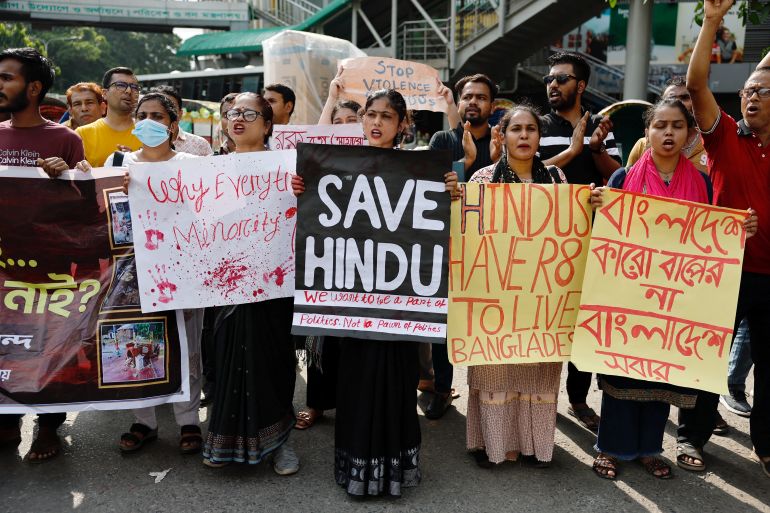New Bangladesh government says working to ‘resolve’ attacks on minorities
Since PM Hasina’s flight abroad, numerous attacks have been reported against Hindu households, temples and businesses.
Hindus block an intersection as they protest against violence towards their community on August 10, 2024, in Dhaka, Bangladesh [Mohammad Ponir Hossain/Reuters]Published On 11 Aug 202411 Aug 2024
Bangladesh’s new interim government says it is working to resolve attacks on Hindus and other religious minorities reported after the ouster of Prime Minister Sheikh Hasina.
Hindus are the largest minority faith in mostly Muslim Bangladesh, and many are supporters of Hasina’s party, the Awami League.
Keep reading
list of 4 itemsend of list
Since Hasina’s abrupt resignation and flight abroad on Monday brought an end to her 15 years in power, there have been numerous reports of attacks against Hindu households, temples and businesses.
“The attacks on religious minorities in some places have been noted with grave concern,” the interim cabinet said on Sunday in its first official statement since its members were sworn in on Thursday night.
The cabinet said it would “immediately sit with the representative bodies and other concerned groups to find ways to resolve such heinous attacks”.
Thousands of people participated in protests on Sunday calling for an end to violence against Hindu communities, the Dhaka Tribune reported.
Protesters objected to the “destruction of homes, encroachment on temple land, arson, looting, and other forms of violence”, the report said.
“We are appalled by the attacks on Hindus, the torture and the vandalism of temples. It is the government’s responsibility to ensure our safety. We are citizens of this country and deserve to live securely,” the Dhaka Tribune quoted a Hindu speaker as saying at a rally in the city of Bogra.
The statement from the interim government, also known as the council of advisers, listed numerous urgent priorities.
The government, led by Nobel Peace Prize laureate Muhammad Yunus, ordered “support” for the families of protesters who were killed in the weeks of demonstrations culminating in Hasina’s departure.
It directed public funds to pay for those injured in the unrest, which began in July and killed more than 300 people.
The council, tasked with steering democratic reforms in the South Asian nation of 170 million people, also said it would reopen the metro system in the capital, Dhaka, by the end of the week and soon appoint a new central bank governor, replacing a Hasina loyalist forced to resign.
